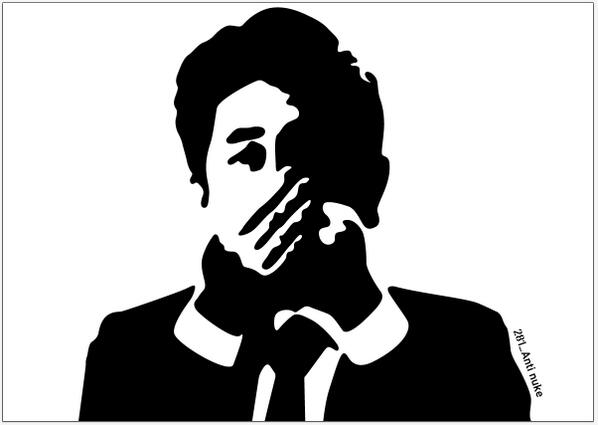
Image by twitter user @281_ for anti-state-secrecy-protection bill.
Japan’s proposed State Secrecy bill continues to stoke controversy after its passage in the Lower House last week. The proposed law would introduce harsh new punishments for leaking national secrets related to defense, diplomacy, counter-terrorism, and counter-espionage.
National security is one of the most important agenda items for the ruling Liberal Democratic Party. The bill, in relation to an already-enacted law that launched Japan's version of the NSC, is considered very important for the party's success.
During a key plenary session and even days after its approval, people opposing the bill rallied in front of the Diet (Japan's House of Parliament), shouting “stop the secrecy bill! The evil bill should be discarded!” This is unusual in Japan — although the Japanese constitution affords citizens the right to assemble, most people will not join public rallies.
Shigeru Ishiba, Secretary-General of the Liberal Democratic Party, found the noise unpleasant, and casually referred to demonstrators as “terrorists” on his blog [ja]:
単なる絶叫戦術はテロ行為とその本質においてあまり変わらない
It seems to me that the tactic of simply shouting at the top of their lungs is not much different from an act of terrorism, in essence.
Taken out of context, Ishiba's comment might sound outrageous, but it's easy for people see protests as hindering political progress, whatever that progress might mean. Later, Ishiba posted an apology and correction [ja] to withdraw the above remark:
整然と行われるデモや集会は、いかなる主張であっても民主主義にとって望ましいものです。 一方で、一般の人々に畏怖の念を与え、市民の平穏を妨げるような大音量で自己の主張を述べるような手法は、本来あるべき民主主義とは相容れないものであるように思います。「一般市民に畏怖の念を与えるような手法」に民主主義とは相容れないテロとの共通性を感じて、「テロと本質的に変わらない」と記しましたが、この部分を撤回し、「本来あるべき民主主義の手法とは異なるように思います」と改めます。
Protests and gatherings held in an orderly nature, are desirable for democracy, regardless of what they stand for. On the other hand, I think protests, which are loud enough to bother neighboring citizens’ peace of mind, and leave citizens in awe by blatantly expressing what they stand for, run counter to authentic democracy. I had written on my blog that such acts are not much different from terrorism because I felt there was something similar about these tactics of scaring and leaving citizens in awe with an act of terrorism, but here I withdraw this part of the sentence, and rewrite it as “different from tactics in the original form of democracy.”
Such remarks have evidently done nothing to turn down the volume of protesters. If anything, it seems to be getting louder. On December 5 and 6, angry protesters marched in Hibiya park at a gathering dubbed “drums of fury” [ja].
A coalition of artists, film-makers, editors and publishers opposing the State Secrecy Protection Bill have gathered over 4,400 endorsements for an appeal [ja] against the bill. Their Facebook page [ja], founded on December 1, 2013, has already reached 8,270 Likes.
In a statement, they called for support from people who engage in acts of expression:
「表現人の会」では、声明の趣旨に賛同いただける方を広く募集しています。
条件は、「声明に賛同する」ことと、「あなた自身が、何らかの表現者」であること。プロ・アマ・経歴・国籍は問いません。
We are calling for people to support our appeal [against the Secrecy Bill]. Anyone engaged in any type of work that involves expressing yourself, regardless of nationality, professional or non-professional work history in expression, is eligible to support our appeal.
Patriotic conservative blogger gintoki commented on the issue, suggesting [ja] that people against the bill are predominantly leftists.
マスコミのみならず、ジャーナリストに弁護士、それに賛同する者達が集まってデモを行う・・・
その集団の後ろには労組系や左派系と思しき団体の幟が林立し、まるで反原発デモか、沖縄の反米・反基地運動かと見間違うほどだが、マスコミが彼らの事を左派系団体だとか、労組系を中心にした…などというその団体の本質的な部分について触れて報道する事は少ない
It is not only the mass media, lawyers, journalists, and people who support them and are coming together and protesting [against the bill] […] This group appears to look like a protest rally of an anti-nuclear power plant, or anti-US base in Okinawa, with multiple banners of unionists and left-looking groups behind them. However, no mass media described them as left-wing groups or unionist groups. Very few reports touch on the fundamental part of the protesting groups.
Until recently, acts of protest were considered some what rebellious and often times protesters were labeled as “professional activists”, “commies” or “leftists”. But since the Fukushima nuclear disaster of 2011, more people have started to take action and we have seen many first-time demonstrators. Yet those who oppose the secrecy bill seem to stretch beyond Japan's so-called left.
A wide range of organizations have expressed opposition to the proposed law. Seven doctors and dentists released a statement [ja] opposing the bill that won the support of roughly 200 doctors and dentists:
私たち医師・歯科医師が「特定秘密の取扱者」になった場合、日常診療において患者さんから得る病歴・薬物歴・精神疾患歴・家族歴などのプライバシーを、国に強制的に提供させられることになるかもしれません。特定秘密に指定されれば、強制も秘密になります。これは医療者の守秘義務に大きく反し、たいへん危険な人権侵害に加担することになってしまいます。
We, doctors and dentists, may have to be obliged to provide the government with private information of patients such as illness history, record of medication, mental health history, family history that we keep from daily consultation, if we are assigned as people who deal with ‘special secret’. Once special secret is designated, we would have to keep the fact that it is enforcement. Such an act would be far from our duty of confidentiality as medical workers, and would assist human rights violation.
The Directors’ Guild of Japan [ja], Writers’ Guild of Japan [ja], and Japan Writers’ Guild [ja] also put out a joint statement against the bill.
To sound the alarm internationally, Japan Computer Access for Empowerment (JCAFE) released an urgent appeal on December 1, saying that the proposed law is dangerous in the following ways:
We think the law is problematic because:
- The scope of “specific secrets” is broad and vague, and how exactly “specific secret” will be designated remains unclear. Especially, there is no regulation which forbids specification of the disadvantageous information for the government.
- The government can permanently designate any information it wants to hide from the public as specific secrets.
- Any independent third-party bodies will not established that have the power to screen information to determine whether it merits being classified as a specific secret. Even the Diet or courts can not check.
- The bill includes serious threats to whistle-blowers and even journalists reporting on secrets. Government officials who, in good faith, release confidential information on violations of the law, or wrongdoing by public bodies, should be protected against legal sanctions.
- Anyone who asks central government employees to offer specific secrets could be subject to punishment on the grounds that they abetted the leakage of secrets. This withers too much the coverage act by all the press containing community media, independent media, and foreign media with the intimidation by punishments.
- The “aptitude evaluation system” is a privacy infringement not only to public servants and the private citizens that have accepted commissions for government contracts but also to their families, friends, and even their romantic partners.
We call upon all members of the House of Councilors to scrap the bill.
The House of Councilors is expected to vote on the bill on the afternoon of December 6.




4 comments